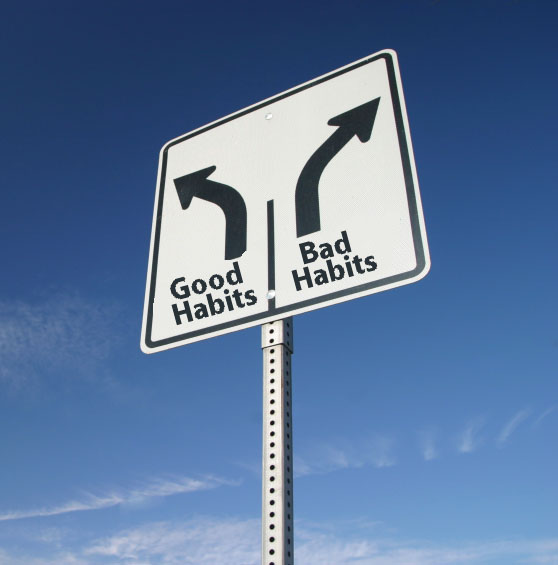|
I’ve got quite a few habits I’d like to change, and it’s been on my mind a lot lately. From daily actions I take that harm me more than help me, to automatic thoughts that limits me in major ways, I have plenty of room to grow and change in positive ways. My inspired quest right now is exactly this: how do we change habits in a lasting way? Here’s my brainstorm so far: 1. Mindfulness meditation. This works especially for unconscious, compulsive actions or automatic thinking habits. We keep engaging in habits that don’t serve us because we are not thinking. It’s routine. It’s what we know and find comfortable. It’s a pathway that has been carved in our brain that is of least resistance, much like a river that cuts a pathway through rock and earth will not flow any other way unless a dam is built and a new pathway is carved. This takes a lot of work! Mindfulness meditation can help us wake up from the trance of habitual thinking and action. With practice, we can start to notice the moment we make the decision to act on a habit, or the moment a thought arises that does not serve us. If you want to know more about mindfulness meditation, ask me. 2. Monitor and change behaviors. This includes several steps.
0 Comments
"Do I contradict myself? Very well, I contradict myself. I am large, I contain multitudes." -Walt Whitman At times I notice all of the ways I judge and castigate myself. How I somehow have this underlying belief that I need to be perfect in order to be worthy. How I often "should" on myself, about small things, actions that don't matter so much in the long run. I think it must be a holdover from my Puritanical ancestors, but all I can say is, I am ready to stop. And I think I may have an idea about how to do it. Do you sometimes find yourself doing this? Maybe berating yourself for that extra bite of chocolate, or shaming yourself for having feelings of neediness? What is it for you? I've been drinking a lot of coffee lately, and recently decided I need to cut it out completely. Whenever I make a decision like this, I immediately start obsessing on whatever it is I am not letting myself have. I convince myself I am having withdrawal symptoms, I get depressed, lonely, I WANT. I fantasize about the taste, the warmth, the giddy caffeine rush I will feel after drinking some of this godly nectar. And then, when I break my promise to myself (which is eventually inevitable), I feel ashamed, like I don't value myself enough to be 100% controlled and basically...perfect. It's a strange game to play, this all or nothing. What ever happened to moderation? As I went through this internal battle, this back and forth talking in my head, I suddenly remembered something I learned from a training I attended with Bill O'Hanlon, called Resolving Trauma without the Drama. And I said to myself, "It's okay if you drink the coffee. It's okay if you don't drink the coffee." So simple, yes? And I felt immediately better, because really, the more important thing in my life is not whether I drink a little bit of coffee. The more important thing is feeling okay with myself, accepting the decision I make, realizing it is a choice, not an action I am forcing myself to take. And then, surprisingly, my obsessive thoughts about how I just NEED some coffee lighten up a little, and I start thinking that maybe I don't really need that coffee after all. Think about it. Someone tells you that you HAVE to do something. Do you want to do it? Of course not, even if it is the absolute best thing for you to do. And the more passionately someone tells you that you HAVE to do it, the more deeply you dig your heels in and decide that you most definitely do not. Or think of a time when someone told you that you couldn't do something. What was your reaction then? If you're anything like a normal person, you probably thought, "Yes, I can damn well do that thing. Watch me!" Then, imagine that person saying, "Well, of course you don't have to. I just thought you might like to try, but it's up to you." And then maybe something shifts inside you. You may start thinking that maybe, just maybe, you want to try what this person is suggesting. The time to use this inclusive validation work is when you:
This is how you use inclusive validation:
And that is essentially what this work is all about: bringing light to the shadow. The shadow. As termed by Carl Jung, referring to all of the disassociated, unowned parts of ourself. The devalued, inhibited, suppressed, should-nots. The parts that, undealt with, turn around and bite us, acting as intrusive thoughts or compulsive, self-destructive actions. The parts that, when integrated, give us great strength and wisdom, that thank us for finally recognizing them as something other than monsters, the parts that, when finally un-shamed and re-valued, make us whole. A few weeks ago, I wrote about the damaging effects of chronic, overwhelming stress. Today, I will follow this up with some ways to heal from these conditions.
1. Hold and be held. Particularly with babies, tactile stimulation does wonders. In one study, a control group held babies for two hours a day while an experimental group held babies for four hours a day. After six weeks, the babies in the experimental group cried 43% less. This applied cross-culturally. Babies who are held more are less likely to develop PTSD or hypercortisolemia. While the first year is so critical for lifelong brain development, I don’t think human touch ever becomes less essential. Sure, maybe we don’t need four hours a day, but hugs, cuddles, and massages go a long way. 2. Medication and/or supplements. I am not one to believe in going straight for the magic pill, but there are several medications that can be helpful if you are feeling very overwhelmed or out of control. Several types of medication can activate Brain-Derived Neurotropic Factor(BDNF), which strengthens neural pathways and can protect the brain from damage by extreme stress. All antidepressants activate BDNF (this is their one common denominator). And guess what? Omega-3 fatty acids are also neural-protective. If you think you may need medication, of course talk with your doctor or psychiatrist. 3. Movement. Exercise also activates the neural pathway protector BDNF. It increases seratonin levels as well. Much of the feeling of PTSD is that of being “frozen.” Movement of any kind can immediately snap one out of that feeling. 4. Make choices that increase safety and structure in your daily life. In events of trauma and abuse/neglect, a common theme is powerlessness. Looking at brain chemistry, BDNF decreases when an individual experiences perceived powerlessness. Of course, it is not possible to always be in control of one’s circumstances, but it is possible to make choices that increase the chances of safety. It is also possible to have a regular schedule that increases predictability in your daily life. This will help. If this point interests you, look into the Seeking Safety program. 5. Mindfulness-based stress reduction. I love this one and regularly incorporate it into my work with my clients. It is a form of meditation and consists of simple exercises one can do to increase one’s mindfulness, which strengthens the brain and increases one’s ability to have control over where attention is placed. There is a lot of good science out there showing that this stuff really works. 6. Facing fears. The act of facing fears actually increases the frontal lobe’s ability to dampen down anxiety. It also gives one a restored sense of self-efficacy and control. When I am at my best, I try to face one fear every day. It is amazingly uplifting. 7. Eye Movement Desensitization Reprocessing (EMDR) Therapy. EMDR is a cutting edge, evidence based alternative to talk therapy for healing trauma or anxiety. It has been shown to work more rapidly in treating trauma than traditional therapies. This is highly desired as it allows you to spend less time reprocessing, or "digesting" the traumatic material. In this sense, you may move forward in life more freely without unresolved emotions from the past being activated by current triggers. This work is client-centered, meaning the resolution and integration of past traumatic events comes from your innate capacity for healing. This may leave you feeling empowered as you find your own ability to move through painful material and make sense of it in a way that lets you grow in wisdom and move forward in life the way that you want to. EMDR is an emotionally challenging therapy, and you may find your symptoms intensifying before they decrease. For this reason, it is important to have a current level of stability in your life before participating. It is also necessary to have the resources to regulate intense emotions. If you choose to pursue this, I can work with you on these skills, and assess whether or not you are in an appropriate space before beginning. I will also provide more detailed information to you directly about this process if you are interested in trying it. I went to a training on Post Traumatic Stress Disorder (PTSD) recently. I did learn quite a bit about how to treat PTSD, but the presenter’s information about the effects of chronic and/or severe stress was what really struck me and stuck with me. So, I am going to blather a bit, and it may be somewhat technical, but hopefully, some of you will find it interesting and learn from it as well. Many of us have probably heard of the stress-related hormone cortisol. What I didn’t know was that chronically high levels of cortisol can cause a condition called Hypercortisolemia. Quite a mouthful, right? Here’s the thing: there are two very important structures in the brain that help us to regulate our emotions (the Arterial Cingulate, or AC, and the Hippocampus). These structures are packed with cortisol receptors, and if they are constantly being bombarded with cortisol, they become damaged and unable to do their job properly. This is hypercortisolemia. I am talking lifelong effects, especially when this occurs in young, developing brains. Impacts of hypercortisolemia: 1) The Artertial Cingulate (AC) has top down control over the amygdala. You know that reptilian part of your brain that gets triggered in the present because something reminds you of painful memories from the past? Even when you intellectually know things have changed, you can't calm down? That’s the amygdala working. It never forgets, but isn’t always rational. So basically the AC is the structure that tells the amygdala, “Calm down, relax, that was then, this is now.” If the AC is damaged, the amygdala is hyperactive, and anxiety goes up. 2) The risk of depression goes up from a 15% chance (general population) to a whopping 58% chance. Not fun. 3) Some of the other clinical outcomes include severe personality disorders (especially borderline, for you other psych nerds out there), attachment problems, vulnerability to PTSD, and chronic PTSD. Obviously this is serious. Take a big breath of relief, because most people will not get this condition. It is not generally caused by your run of the mill everyday stress. Causes/ Risk Factors of Hypercortisolemia: 1) Ongoing trauma or chronic stress 2) Prenatal conditions: Cortisol can cross the placental barrier and damage a developing brain. Depressed or chronically stressed pregnant women will want to have their cortisol levels screened and possibly take anti-depressants (or find other ways to reduce stress) if they are high. 3) Severe neglect Now I am going to go on a bit of a tangent and talk a little bit about severe neglect, as the effects are quite tragic. Some of the behavioral symptoms of severe neglect include hypersensitivity (reacting more strongly to stress and taking longer to calm down), self-mutilation, and aggression. Another symptom of severe neglect is alcohol abuse. In studies with primates, when all of the monkeys were given alcohol, it was the neglected monkeys who drank regularly and excessively. Individuals who have experienced severe neglect also are more likely to have lifelong attachment problems. Studies on primates also show that neglected monkeys are not accepted, as they do not know how to read social cues. Neglected monkeys will have no mates. If they are inseminated, they will not take care of their babies (as a side note, this makes me kind of want to hurt whatever researchers felt the need to so deeply damage these poor monkeys).
Severe neglect can also cause lifelong neurobiological changes. Cortisol goes up (increased anxiety, depression, and lack of deep sleep). Seratonin goes down (more irritability, anxiety, impulsivity). Oxytocin goes down (causing problems with developing healthy attachments). Another uplifting animal study: Infant rats were separated from their mothers for six hours a day very early in life. Another group was also separated, but continued to receive tactile stimulation. The control group was left to bond with their mommies. After a bit of all this, these amazing researchers threw all of the rats in a tub of water. Guess what? Those rats that stayed with their mommies and those rats that continued to receive tactile stimulation both fought for their little rat lives for TWICE as long. Obviously, it is the very young brain that is most at risk here. However, experiencing trauma also happens to quite a lot of us, more than I like to believe is true. Take home message? Take care of your baby. Get checked out if you are pregnant and tend toward depression or have a lot of stress in your life right now (but don’t stress!). If you do go through something traumatic, ask for help if you are feeling you are not getting back to normal after a month or so. I will post soon with ways that you can deal with and heal these conditions. |
AuthorLeilani Jefferies, LCSW Archives
March 2016
Categories |



 RSS Feed
RSS Feed